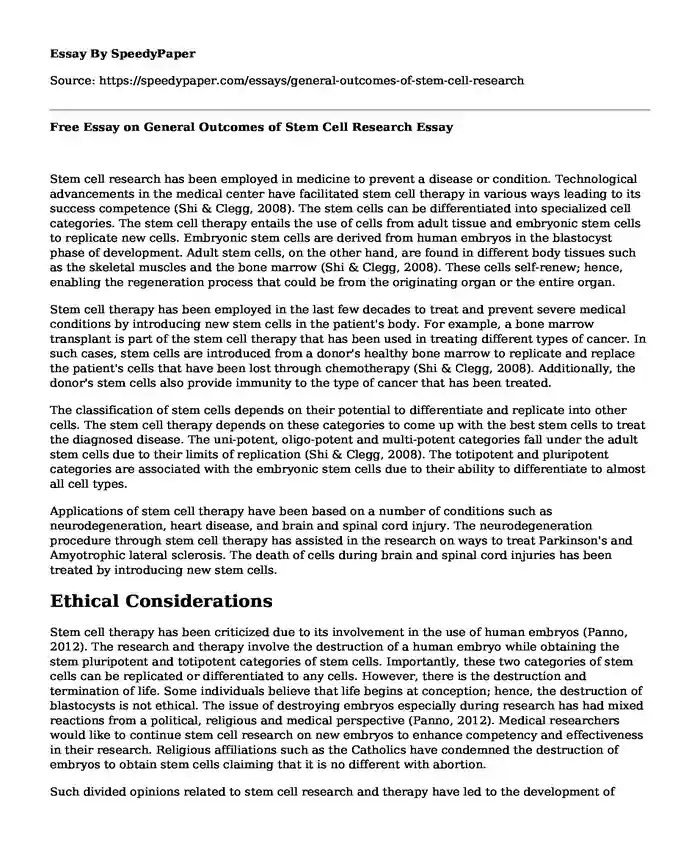Stem cell research has been employed in medicine to prevent a disease or condition. Technological advancements in the medical center have facilitated stem cell therapy in various ways leading to its success competence (Shi & Clegg, 2008). The stem cells can be differentiated into specialized cell categories. The stem cell therapy entails the use of cells from adult tissue and embryonic stem cells to replicate new cells. Embryonic stem cells are derived from human embryos in the blastocyst phase of development. Adult stem cells, on the other hand, are found in different body tissues such as the skeletal muscles and the bone marrow (Shi & Clegg, 2008). These cells self-renew; hence, enabling the regeneration process that could be from the originating organ or the entire organ.
Stem cell therapy has been employed in the last few decades to treat and prevent severe medical conditions by introducing new stem cells in the patient's body. For example, a bone marrow transplant is part of the stem cell therapy that has been used in treating different types of cancer. In such cases, stem cells are introduced from a donor's healthy bone marrow to replicate and replace the patient's cells that have been lost through chemotherapy (Shi & Clegg, 2008). Additionally, the donor's stem cells also provide immunity to the type of cancer that has been treated.
The classification of stem cells depends on their potential to differentiate and replicate into other cells. The stem cell therapy depends on these categories to come up with the best stem cells to treat the diagnosed disease. The uni-potent, oligo-potent and multi-potent categories fall under the adult stem cells due to their limits of replication (Shi & Clegg, 2008). The totipotent and pluripotent categories are associated with the embryonic stem cells due to their ability to differentiate to almost all cell types.
Applications of stem cell therapy have been based on a number of conditions such as neurodegeneration, heart disease, and brain and spinal cord injury. The neurodegeneration procedure through stem cell therapy has assisted in the research on ways to treat Parkinson's and Amyotrophic lateral sclerosis. The death of cells during brain and spinal cord injuries has been treated by introducing new stem cells.
Ethical Considerations
Stem cell therapy has been criticized due to its involvement in the use of human embryos (Panno, 2012). The research and therapy involve the destruction of a human embryo while obtaining the stem pluripotent and totipotent categories of stem cells. Importantly, these two categories of stem cells can be replicated or differentiated to any cells. However, there is the destruction and termination of life. Some individuals believe that life begins at conception; hence, the destruction of blastocysts is not ethical. The issue of destroying embryos especially during research has had mixed reactions from a political, religious and medical perspective (Panno, 2012). Medical researchers would like to continue stem cell research on new embryos to enhance competency and effectiveness in their research. Religious affiliations such as the Catholics have condemned the destruction of embryos to obtain stem cells claiming that it is no different with abortion.
Such divided opinions related to stem cell research and therapy have led to the development of different policies. For instance, President Obama supported U.S. Federal Funding on embryonic stem cell research. Despite the unethical issues surrounding stem cell therapy, there should be enhanced embryonic without the destruction of embryos due to the perception of human potential and humanity. Balancing life and research through advanced technologies will lead to enhanced treatment and protection through stem cell therapy.
References
Panno, J. (2012). Stem Cell Research: Medical Applications and Ethical Controversy. New York: Infobase Publishing.
Shi, Y., & Clegg, D. (2008). Stem cell research and therapeutics. Berlin: Springer Science & Business Media.
Cite this page
Free Essay on General Outcomes of Stem Cell Research. (2022, Jun 07). Retrieved from https://speedypaper.com/essays/general-outcomes-of-stem-cell-research
Request Removal
If you are the original author of this essay and no longer wish to have it published on the SpeedyPaper website, please click below to request its removal:
- Free Essay on The 9/11 Commission Report Omissions and Distortions Book
- Free Essay with a Case Study on Shame
- History of New York from 1800-1930, Essay Sample
- Free Essay Sample on Teen Depression and Suicide
- Free Essay Dedicated to George Washington and Power of Patience
- Free essay about impacts of Technology and New Advancements in Nursing
- Essay Sample on Overview and History: Starbucks
Popular categories





